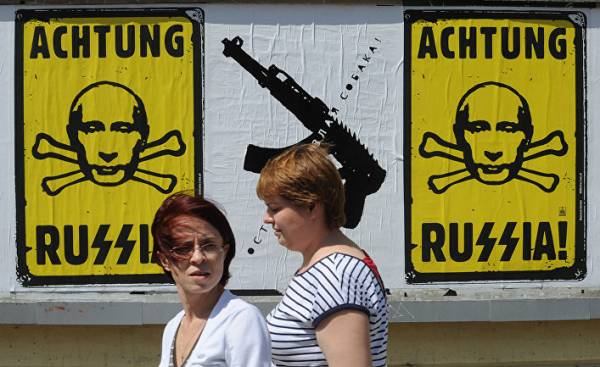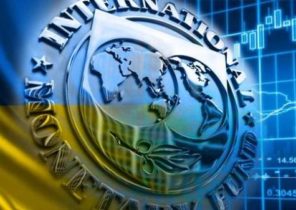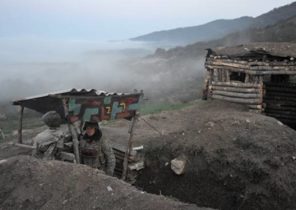
Interview with an employee of the Jagiellonian University historian Andrzej Praise.
Interia.pl: What emotions prevail in relations between Poland and Russia?
Praise Andrzej (Andrzej Chwalba): I would look at the topic more broadly: in Polish-German relations emotions are present too, although this is feelings of a different kind. In turn, in contact with other neighbours — the Czech Republic, Slovakia or Lithuania — they do not play a big role. However, in the case of Lithuania due to the policy of Vilnius against poles, they are still present. But, really, the strongest emotion (though traditionally) filled with Polish-Russian relations. So it was in the interwar period, during the Second world war and after it.
Despite the fact that relations between the Polish and Soviet Communists were “good” (in other they officially be and could not), at the community level is dominated by negative feelings. They were connected with contemporary history: the emergence of information about the Katyn crime in 1943, the Soviet policy towards poles and the Polish economy after 1945, the arrests and executions of soldiers of the home Army, the repression of the NKVD against the rebellious intelligentsia. For emotions the poles could be traced, in particular during sporting events — football, hockey, and Boxing matches, Cycling races. Some of them have become part of the history of Polish-Russian relations.
Polish athletes, competing with the Soviet, supported by thousands of fans who could give vent to spontaneous emotions. In other circumstances, to Express anti-Soviet feelings were very new and risky. The experience of Polish-Soviet relations at the time of commissioning, the memories of Soviet repression, violence, domination of Moscow has left its mark on relations between Russia and Poland after 1989.
— What are the tools used by Russia to fuel negative emotions? Historian Andrzej Nowak (Andrzej Nowak) identifies in this respect, the bullying.
— This is true. However, modern attitudes and emotions that filled the Polish-Russian contacts, is also influenced by tradition and history, including memories of how Russia in the nineteenth century, suppressed in our rebellion. These traditions are cultivated by both sides. In the early 1990-ies, it seemed that the passion subsides, and mutual relations will be able to bounce back. From Russia there were positive signals. First, Russian troops without much resistance left Poland and GDR territory. President Yeltsin understood that Polish-Russian relations it is necessary to establish, and this is to start cooperation at the level of the two societies to guide the accumulated emotions in the right direction. Yeltsin’s gestures — condemning the Katyn massacre and the words “forgive us” — met in Poland a positive reaction.
In the same period began the normalization of Polish-German relations. Emotions that had arisen between the poles and the Germans weakened. The reconciliation was a success: the positive feelings prevailed over negative. All began to take shape through a series of diverse meetings and political gesture that became a symbol of balanced rational German policy. The important role played by attempts to revive the inter-human contacts. Thousands of poles work in Germany and return home with good memories. Relations between German employers and Polish employees may not have been perfect…
— …is it correct?
— You could say that. In the end, the hostility, the hatred of Germans and Germany, connected with the history, and especially during the Second world war and brutal occupation, subside, especially among young people. To cool emotions and helps the cooperation within the framework of the EU and NATO. In the Polish-Russian relations these processes occurred differently. Hope for change for the better, which appeared in the 1990s, was replaced by a period of exacerbation. Demons and negative emotions came back. We lacked and still lacks direct contacts between Polish and Russian citizens. There remains a big charge aversion, which affects the relations between people, rather, leads to the fact that these relationships exist. We turned away from each other, closed our knowledge about the neighbors do not go beyond stereotypes.
— On the one hand we see focuses on the reconciliation of rational German policy, and with another — Russia, which States that her army two days to get to Warsaw, and provocations. For example, the Russian su-24 scared in the Black sea the crew of the USS Donald Cook, imitating an attack and turning off his air defense system. In the end, the us military had to seek psychological help. It is a vivid example of the policy of intimidation.
— Add to this the threat from the Russian-Ukrainian borderland or transfer in Kaliningrad oblast, to the border of complexes “Iskander” missiles equipped with nuclear warheads.
— All these actions show that the desire for normalization and smoothing of the tension there.
Is the language of war, and of course, that the people of Poland fear and it fixes accumulated over many years of negative emotions. We believe the Russians are unreliable and treacherous person difficult to talk to. Even if he signs the contract, it will not abide by its terms. This perception may not match reality, but it interferes with the contacts. In Russia imagine the poles arrogant swaggering “pans”, which does not contribute to weakening emotions.
The poles meet with the Russians during the holidays. According to reports, a tour Desk and comments, the Russians on holiday are kept apart from everyone, not just us. They may be afraid of these contacts or don’t feel ready to talk and Dating. To minimize negative emotions could be through the interaction at the level of local governments, regions, organizations, associations. Such contacts are few and the Russian side shows interest in them: the work of Polish-Russian group on difficult matters (established in 2002 the team of the experts of the two countries) and other similar organizations actually stopped.
Andrzej Nowak, which is part of the Group on difficult issues in his book “the Subjection or independence” seeking the origins of the antipathy to the legacy of the tsarist Russia, speaking about the Russian Imperial ideology and the concept of “Moscow — the Third Rome”. To this is added the fresh memories of the fact that the countries of East-Central Europe was depending on the Soviet Union…
— And about the war and postwar crimes.
Yes. But there are still Bronislaw lagovskaya (Bronisław Łagowski), who emphasizes in his book “Poland, a sick Russia” that our country is peculiar exaggerated, bloated, sometimes comical “bestial Russophobia”. These two terms contradict each other.
— This is a different topic. Professor Novak explores the origins of mutual relations, and it was the Professor notes that in Poland are stirring negative emotions and cultivate hostility to Russia. There are people who, as it was, I think, is that to swing a sword or poke the bear silly, but with Putin and his entourage should speak the language of diplomacy. But it’s not that simple, and usually these methods are not too effective. Here we can recall that the Polish-Russian relations were not always as bad as now. In the first years after the Congress of Vienna, when the Kingdom of Poland, the Polish elite was very happy with the policy of Tsar Alexander I. Before 1815 Prince Adam Jerzy Czartoryski (Adam Jerzy Czartoryski) was the Russian Minister of foreign Affairs, and on the eve of 1914 during the First world war, poles who lived in territories that were part of the Russian Empire, viewed Russia as an ally of Poland, linked with her political hopes. They are, as a rule, negative attitude to the policy of Pilsudski and the Polish legions. During the First world war the Russian government made gestures that were welcomed by the poles. So supporters of the Polish-Russian reconciliation can find in the history of the arguments in its favor.
— What gestures the Polish side can be called a manifestation of good will and the desire to normalize relations with Russia?
We have taken different steps, not only in the political but in the cultural and scientific sphere. However, Russia’s Imperial policy did not allow to implement a wonderful project called “Poles in St. Petersburg”, which was prepared for several years. Had to freeze other projects in this area. According to the Polish (Krakow) initiative held a lot of very useful congresses, contributing to the strengthening of Polish-Russian relations, but because of the war in Ukraine, everything stopped. In turn, in the political sphere such gestures, the employees of detente, was not enough. Imperial policy of Putin, the attack on Georgia and Ukraine has left its mark on our attitudes and emotions.
— Putin was talented or even outstanding implementer of the Kvitsinsky doctrine-falina?
— It is clear now to every serious European policy. It is known that the so-called Russian soft power, that is, in particular, the export of Russian culture to European markets, as well as the supply of oil and gas, it is more efficient than the army.
— Energy dependence, intimidation, soft power. What other instruments Russia?
After 1945, the Soviet Union tried to subjugate Western Europe. He was assisted by left-wing intellectuals, mass pacifist and environmental movements, which he supplied means. Once the Soviet Union collapsed, all these demonstrations and movements in the West have disappeared since lost the source of funding. The Russian Federation declared itself the successor of the former Soviet state. She has many years in a row with the Brussels lobbyists trying to influence Western politicians: some attract, others quarrel among themselves. It is known that Putin follows the rule not to negotiate with the EU…
— to establish contacts with individual member States. It is noticeable.
The European Union is realized. When the EU leaders are negotiating alone, they know that behind them the authority and power of the whole European community, and in military Affairs — NATO. Its aggressive policy of Moscow woke up the Americans, who ten years ago tried to gradually withdraw from Europe. They have closed bases and moved them to the United States. Putin stopped this process, and this, perhaps, should be called a defeat of Russia. He managed to unite the Europeans and Americans, in the end, the Russian and Belarusian border appeared NATO, including U.S. forces, now they are renewing and strengthening. Putin enjoys strong support among Russians, and so we nervously react to any words they address to us.
In 2012, the head of the Russian Orthodox Church, Patriarch of Moscow and all Russia Kirill and the Chairman of the Polish Episcopal conference Archbishop józef Michalik (Józef Michalik) signed a document entitled “Joint message to the peoples of Russia and Poland”. If you can call it historic for our relations event?
— Unfortunately, no.
Why?
— It was a single gesture that gave no results.
— A political gesture?
One gesture is not enough, we need a long and intensive process, as in the case of Poland and Germany. Here no further steps followed. The Orthodox Church subordinate to the state. She didn’t get the “green light” for any meaningful action that could give a positive result. So it was all over.
It’s been almost five years.
— Yes, the theme is frozen.
— Was filled with some political sense, the choice of the place at which was signed the document — the Royal castle in Warsaw?
— Now it remains only to regret the missed opportunities.
— XIX century, residence of the Royal governors…
— So.
— Additional historical context and additional emotions. These emotions, in recent years, becoming more and more. The first thing that comes to mind: the theme of the return of the wreckage of the presidential “Tupolev”.
— Smolensk tragedy gave the Russian authorities another tool that can be used in the political game. The plane and all that it involves, including the question of the monument at the crash site, are used for this game and the pressure with which the Russians seek to obtain from the Polish side of different kinds of concessions. In addition, using the theme of the Smolensk tragedy, Russia bleeds between our politicians. The Polish government can go into opposition, and the opposition to be in government, but the problem will remain. After this catastrophe, I immediately thought that Moscow will be able to use it for their own purposes, pursuing its interests in Poland. That she does so far.
— What is missing of our historical policy? What are we doing wrong?
— This question is difficult to answer briefly. I would point to several aspects. First, the historical politics involved different institutions, in this sense, it is multi-component. It is the responsibility of both state and local authorities that have its own historical policy. It also involved different organizations, such as the Polish historical society, which in October 2017 in Krakow will organize the Third Congress of foreign researchers of Polish history, there will be 250 speakers from different continents. It is scientists who deal with history of Poland. The holding of such congresses the Society considers part of its mission. It wants to in the world knew about the Polish traditions, culture and history to stereotypes and misconceptions rooted in the past, and we got acquainted with each other. At the Congress are expecting a large group of historians of Russia.
Secondly, the historical politics involved all the European countries, giving it a higher or lower value and using different tools. The history of the society, the nation, the state is an integral part of the culture, intellectual life and politics. It is, of course, may be associated with the promotion, but does not need to be such. You can tell others about their culture, tradition, contribution to the cultural heritage of Europe and the world. This offends nobody, not cause negative emotions and, conversely, cools them, can contribute to the economic and interpersonal contacts.
And relations between States.
But also to affect how we are perceived in other countries. This, in turn, opens the way for investment, trade relations, the presence of Polish companies abroad. What we perceive affects the efficiency of investment and, therefore, their image do it all. Even Iceland presents itself as an open country that is proud to have established Europe’s first Parliament.
— Do you see the prospect that relations between Poland and Russia in the near future to improve?
— It’s hard to make predictions, because historians engage the past. Who knows what will happen in Russia when I leave President Putin. The personality of a leader has a significant influence on Russian politics. Gorbachev’s policy differed from the policy of Yeltsin and the policy of Yeltsin — Putin’s policies. This policy was different, but overall Russia will return to their Imperial traditions as a liberal and democratic tradition there. In addition, the Imperial policy related to bullying and hegemony, like the Russians. This is the main problem. In this situation, it is difficult to be optimistic, especially since we became part of the Western Atlantic world. Now we have to look at the relations between Warsaw and Moscow from the perspective of Washington, Brussels, Paris, London and Berlin. Our allies also don’t show an excessive optimism, but this does not mean that we should abandon beneficial to both parties economic contacts.







